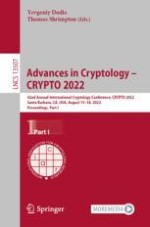2022 | OriginalPaper | Buchkapitel
Certified Everlasting Zero-Knowledge Proof for QMA
verfasst von : Taiga Hiroka, Tomoyuki Morimae, Ryo Nishimaki, Takashi Yamakawa
Erschienen in: Advances in Cryptology – CRYPTO 2022
Verlag: Springer Nature Switzerland
Aktivieren Sie unsere intelligente Suche, um passende Fachinhalte oder Patente zu finden.
Wählen Sie Textabschnitte aus um mit Künstlicher Intelligenz passenden Patente zu finden. powered by
Markieren Sie Textabschnitte, um KI-gestützt weitere passende Inhalte zu finden. powered by
